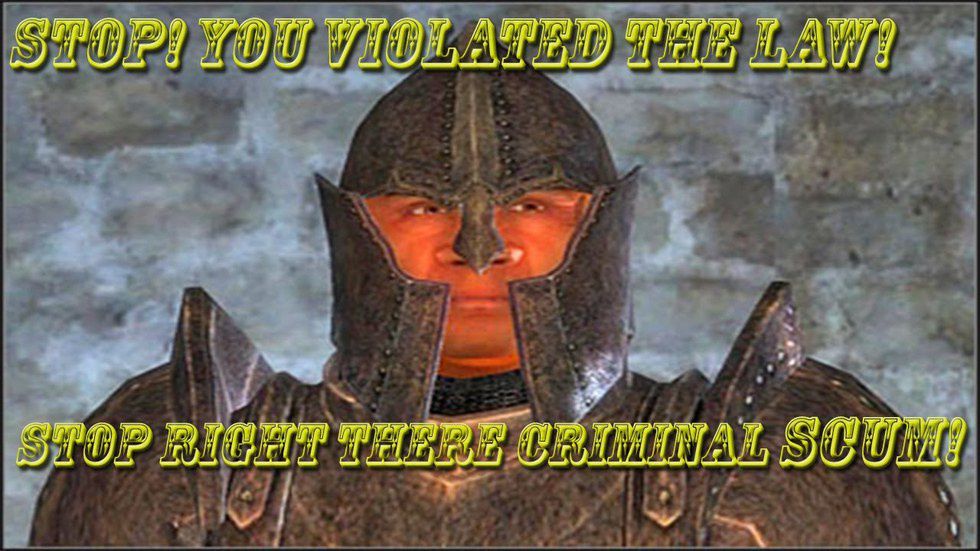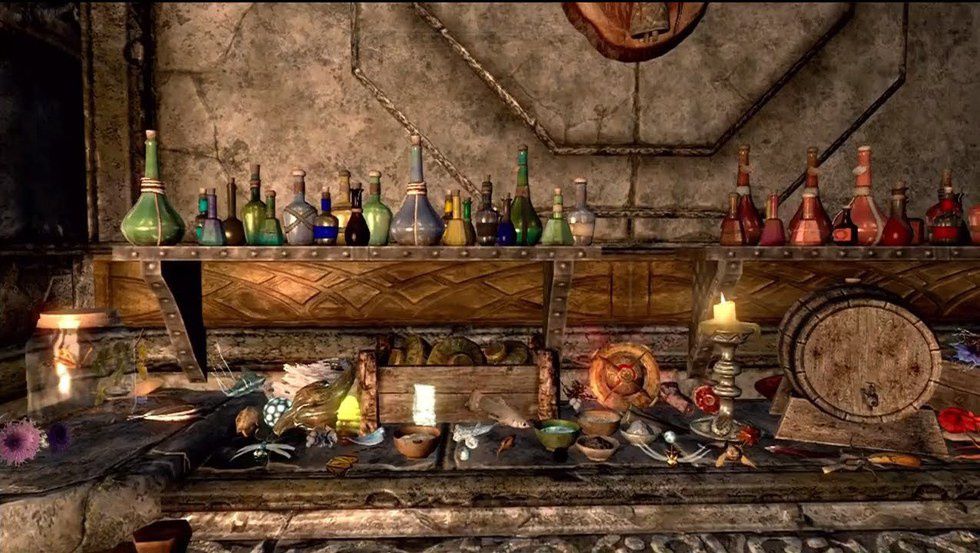Some people play video games as a way to kill time or hundreds of NPCs, or because they enjoy the game for itself. There is nothing wrong with any of those things, but just like most forms of entertainment or art, there is often more going on in video games than just mechanics, engines or renderings. Movies remain a huge part of our culture, but according to Fortune.com earlier this year, the video game industry surpassed 23 billion dollars in the US alone and that is not counting Japan or Korea at all. Even if you do not play games yourself, you probably know someone who does and have been affected by the industry in other ways.
Though hopefully not this way.
The point is, if video games are still nerdy things to play, then a whole lot of people have become nerds. At this point, video games are a legitimate form of art, no more or less important than movies. People search for deeper meaning in movies: why not do the same for games? I am not going to be talking about one specific game, or even one genre in this article, but looking various examples from across the industry. That said, I will be referencing some of the same types of games. Just as some movies are fluff and have no hidden meaning, some games are the same, so I will be talking mostly about games above a certain threshold of complexity. I will be holding up these games, and aspects of them, as examples of other ways we can learn about our own reality, just as poignant as other forms of art and in some cases, I believe video games teach these lessons better than movies or books.
Actions Have Consequences
This one may seem obvious at first, but how many people do you know that have never learned this seemingly simple lesson? I know that I can think of more than a few. Video games have fairly poignant ways of teaching this lesson that many other comparable mediums do not, and some gamers, myself included, often fall back on what we learned playing games when thinking about a course of action. Many video games build consequences into their worlds, but some games do this far better than others.
The expansion to the original "StarCraft," "Brood War" features a fantastic mission setup where you must choose between two buildings to destroy in order to gain victory, and your next mission depends on what you do in this one. You will face either a fleet of the most powerful capital ships in the game, or a team of agents who will target your base with nuclear missiles. Your actions in one mission directly affect the path you will take, and some thinking has to go into your decision. Which building is easier to take out in this mission? If I take the easier road now, what will I face in the next mission? What am I good at fighting, agents or battleships? Your actions will have consequences that you cannot undo, and "Morrowind", the third installment in the "Elder Scrolls"series, does this even better than "Brood War". The more you help one group of mages, the more another group dislikes you, and you eventually have to make a choice between them: one group will love you, and the other will hate you. You cannot do both. A real life example might be choosing between Greek Houses to join in college, or gangs in prison, but the point is you can learn that your actions towards one group will have consequences with another from a video game long before you go to college.
Justice/Morality Systems are another, albeit more general, example of this lesson: if you commit a crime and are caught, you are chased by guards and arrested/killed, depending on the severity of the crime. These systems are featured in the "Assassin's Creed" games, "Elder Scrolls", "Grand Theft Auto", "Fallout" and many more. Some are better than others, but the best example I can think of is another Elder Scrolls game, Oblivion. In that game, the more good or bad things you do, the more fame or infamy you gain as a character. The more you help people, strike down evil, and complete quests for the “good” factions, some evil characters will not talk to you, and some quests are locked. The opposite happens when you choose an evil path, and after a point, you are attacked by guards on sight.
This was original once, and only once
We can learn that actions have consequences in real life, and we do, but games can teach us that almost as well, and with fewer real consequences that life. Better to learn in a game that stealing a sweet roll will get you attacked with a sword than in real bake shop. That said, this is one area where video games do not have a corner on the market in teaching this lesson: movies, TV and other mediums will teach this just as well. The same cannot be said for the other entries in this article.
There is no “Good Guy”
This one is best seen in "ESV: Skyrim" where you must pick a side in a civil war. Your choices are the Imperial Army, who are the ones in charge of the area, or the Stormcloaks, who are the rebels fighting to take back their homeland. You can sympathize with either, but the more you learn about each side, the less comfortable you become with aligning yourself with them. The Imperials are intolerant of the religion of the Stormcloaks, and serve at the behest of the evillest faction in the game (the Aldmeri Dominion), but the Stormcloaks are racist, and treat any race but their own with brutality and disgust. Your ideological choice at the beginning becomes a choice between two evils, and whomever actually wins the war, those problems will persist. There is no “good” choice, just a less-bad one.
The "Assassin's Creed" franchise is headed this way, with the series following the ongoing conflict through the centuries between the Assassins and the Templars. Both have done terrible things, and both kill without conscience, but you play as both factions in different games. In the original game, there were many differences between the two groups, but as the series moved forward and we got to see a little more behind the curtain, the groups began moving towards each other, until they are essentially just two sides of the same coin. Once again, there are no real good guys and bad guys.
And really, our world is kind of like that. No one is perfect, we have all done bad things, and on a large scale, there are no true “good guys.” George Bush was a hero for a while after 9/11, but now he’s a scapegoat, and is remembered as the guy who started the war. Abraham Lincoln freed the slaves and led our country through the Civil War, but he also took some of the first steps towards a looser interpretation of the Constitution and an imperial presidency. Your character in "BioShock" (SPOILER). Captain America is a part of HYDRA.
Also this bastard. You know what you did.
Video games can show us the complexity and depth of people in a way that movies cannot, because we are actively participating in the world, and following a story that we have integrated ourselves into, instead of just watching it go by independently of what we do. The games we play have the potential to teach us about our heroes, and show us the light and dark sides of every person, again, if the game is well-made.
The Kind of Person that you are.
Short of real life, there is no better place to learn about yourself and what kind of person you are than in a video game. Games that are open-world and let you do more or less whatever you want are especially good at this, but it is also evident in the kinds of games you gravitate towards, and in how you react to the events in the games.
In sandbox games, I usually try to play as the hero: I kill, but never without cause, and I genuinely have a hard time being a dick to NPC. I also have a dark side to my game characters though, because when I am affected by an event or arc in the story told by the game, I tend to react emotionally. A lot of people tend to die when my companions are killed. Other times, I play evil, and there is no one worse than me in the game, but I feel guilty. I learned that I have an over-sharp conscience, and it was video games that taught me that. I learned that I am the kind of person who will try to justify everything before he does it.
Apparently I’m also the kind of person who does this when I should be saving the world
Another way to find out about aspects of yourself is how you react to events and scripts in-game. The best example of this I can think of is the mission No Russian in "Modern Warfare II", where you are expected to participate in a civilian massacre. Anyone who has played through this mission will never forget it:
How did you react? Shame and guilt? Glee? Grim determination to finish the mission? Your reaction should tell you a lot about yourself. Other examples of this can be found in "StarCraft", when you plant the beacons that will call murderous aliens down on a city with civilians inside, or in "Bioshock", when you must decide whether to harvest power from the Little Sisters or heal them.
A look into your own mind (or soul, if that’s your thing) can also be gained when you examine what kind of video games you play and why. Do you play games that glorify violence? If so, do you play them because it gives you pleasure, or an outlet, or just boredom? Some simple flash games like "Happy Wheels"or "The Torture Game"can be good ways to pass the time, but what kind of mind really enjoys a game like that? I am not any better in this area, and I can only paraphrase John Oliver and say “there is a part of me that even likes this… It’s a part of me I hate, but it is a part of me.” That might be the best approach to games that include truly senseless violence: sure, there is a legitimate market for this, and maybe it’s better that we are playing these games instead of actually committing murder, but the enjoyment is emblematic of a flaw in ourselves.
In conclusion, I am not trying to say that anyone who plays video games just because they are fun is wrong: they are fun. That is what they were intended to be. All I am saying is that they can be so much more (and have been for some time) if you look at them as more than just a pastime. The lessons that the player can learn from video games are powerful one, and ought not to be discounted just because of where those lessons came from. Games can point out these lessons better than almost any other medium, because of our investment in them, and maybe next time you sit down to play, think about what it is you can learn from your time out of reality. It might help reality make more sense.























